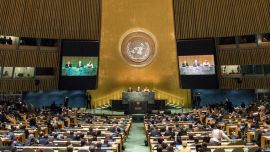Argentina's much-anticipated World Cup debut turned sour on Tuesday as Lionel Messi and his team-mates were dealt one of the biggest shocks in the history of the competition. Now, the Albiceleste are forced to return to the drawing board as that long unbeaten run lies shattered in pieces, needing to improve – and fast – lest the entire campaign end in a similar fashion.
It certainly did not appear at first that the Lusail Stadium would play host to an historic upset. The millions of Argentines who had forced themselves out of bed at first light and dutifully queued up outside bakeries the length and breadth of the nation for their morning pastries did not have to wait long for the breakthrough.
With just 10 minutes played, and having already forced a stunning save from Saudi Arabia keeper Mohammed Al Awais, Messi stepped up to score with ease from the penalty spot after Leandro Paredes had been bundled over in the box. Surely, it would be the first of many: the middle-eastern side looked outmatched in that frenetic start to the game, and Argentina could already glimpse a resounding win to kick off their campaign.
What instead followed was a masterful comeback from the underdogs, aided by Argentina's own glaring frailties. One of the nagging doubts over this team was whether coach Lionel Scaloni, whose great virtue on the bench has been in putting together and motivating a tight-knit side, would be able to keep up with the world's best when it came to strategy. The early signs were not encouraging.
Scaloni was outfoxed by French footballing bohemian Hervé Renard, whose cosmopolitan CV includes stints in England, Algeria, China and Vietnam as well as the national teams of Morocco, Angola, Zambia and Cote d'Ivoire, taking the latter two to Africa Cup of Nations glory while also leading Morocco to the 2018 World Cup. Acknowledging that sitting back and hoping for the best against Argentina's superstars was as good as admitting defeat, Renard instead went for the Albiceleste's throat, pressing and harrying across the pitch to force errors while trusting in his high defensive line to keep the likes of Messi and Lautaro Martínez safely away from goal. It did, just, and with a little help from VAR – Argentina had the ball in the net three times but each was overturned due to a marginal offside.
Having taken all of the favourites' best shots in the first half, Saudi Arabia then decided to throw a few haymakers of their own. Saleh Al-Shehri and Salem Al Dawsari hit two stunning goals within five minutes of each other after the restart, leaving Argentina shell-shocked and lost on the field. Only then was Scaloni prompted to shuffle his deck, but crucially the same system that had spluttered under the Saudi pressure – an under-manned midfield, no attacking outlet other than the long ball over the top – remained in place and proved similarly ineffective. Despite continuing to push hard for an equaliser the nation fell to a defeat that shook the entire sporting world.
Complacency, naivete, a lack of preparation and fitness, or all of the above? This was clearly not the same Argentina team that has been so impressive over the last three years, perhaps unsurprisingly so when so many key pieces (Paredes, Rodrigo De Paul, defender Cristian Romero, even Messi himself) were so notably under-par across the 90 minutes. By that same token, they have not become a bad team overnight. But two more daunting fixtures loom in the shape of Mexico and Poland, and another defeat would spell the end of this World Cup quest before it even really got started.
Argentina will have to bounce back fast from an upset as shocking as that infamous loss to Cameroon in 1990, and prove they have the resilience and intelligence to recover and put their campaign back on track.



















Comments